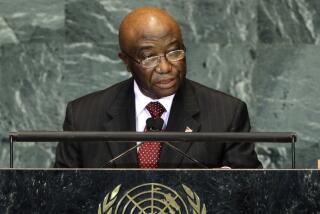Funny Business in Liberia
- Share via
The restoration of civilian rule and the introduction of multiparty politics in Liberia have been marred by evidence of widespread fraud and vote manipulation. This has placed future American aid in doubt, and it should.
Samuel K. Doe, who seized power in a bloody coup five years ago, won the presidential election and his party won a majority of both houses of the Legislature in a “genuine, honest and fair” election, according to the commission that supervised the voting.
But diplomats, opposition party leaders and others suggest that Doe’s victory was contrived in the extraordinary two weeks that passed between the close of the polls and the announcement of the results. The 50.9% vote for Doe was more likely closer to 25%, according to those who watched the ballots being counted at the polling places, our correspondent, Charles Powers, reported from Monrovia.
The result could have been worse. Multiparty representation has been permitted. The nation has been spared the stifling one-party politics of so many other African nations. The election, however contrived, is a step away from the military dictatorship that was part of another unpleasant pattern of the continent. Under intense international pressure, the government released Ellen Johnson-Sirleaf, a distinguished economist, from detention and she won an opposition seat in the Senate, assuring a voice in government for those resisting Doe’s control.
But the U.S. Congress should look carefully at the election, and Doe’s intentions, before abandoning the decision to withhold further American aid in the absence of democratic rule.
More to Read
Sign up for Essential California
The most important California stories and recommendations in your inbox every morning.
You may occasionally receive promotional content from the Los Angeles Times.










